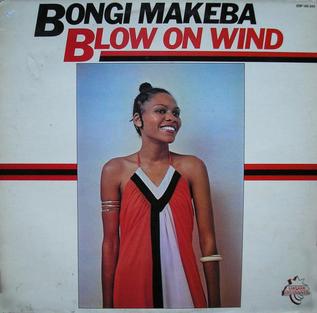
Ahmed Sékou Touré was a Guinean political leader and African statesman who became the first president of Guinea, serving from 1958 until his death in 1984. Touré was among the primary Guinean nationalists involved in gaining independence of the country from France. He would later die in the United States in 1984.

Guinea is a West African nation, composed of several ethnic groups. Among its most widely known musicians is Mory Kanté - 10 Cola Nuts saw major mainstream success in both Guinea and Mali while "Yeke Yeke", a single from Mory Kanté à Paris, was a European success in 1988.

Zenzile Miriam Makeba, nicknamed Mama Africa, was a South African singer, songwriter, actress, and civil rights activist. Associated with musical genres including Afropop, jazz, and world music, she was an advocate against apartheid and white-minority government in South Africa.

Bongi Makeba was a South African singer-songwriter. She was the only child of singer Miriam Makeba with her first husband, James Kubay.
Bembeya Jazz National is a Guinean music group that gained fame in the 1960s for their Afropop rhythms. They are considered one of the most significant bands in Guinean music. Many of their recordings are based on traditional folk music in the country and have been fused with jazz and Afropop styles. Featuring guitarist Sekou "Diamond Fingers" Diabaté, who grew up in a traditional griot musical family, the band won over fans in Conakry, Guinea's capital city, during the heady days of that country's newfound independence. Bembeya Jazz fell onto harder times in the 1980s and disbanded for a number of years, but reformed in the late 1990s and toured Europe and North America in the early 2000s.
British Library Sounds is a British Library service providing free online access to a diverse range of spoken word, music and environmental sounds from the British Library Sound Archive. Anyone with web access can use the service to search, browse and listen to 50,000 digitised recordings. Playback and download of an additional 22,000 recordings is available to Athens or Shibboleth users in UK higher and further education. The service was originally launched with funding by the Jisc.

Sekouba "Bambino" is the stage name of Sekouba Diabaté, a singer and musician born in Guinea, West Africa, in 1964.
Balla et ses Balladins was a dance-music orchestra formed in Conakry, Guinea in 1962 following the break-up of the Syli Orchestre National, Guinea's first state-sponsored group. Also called the Orchestre du Jardin de Guinée, after the "bar dancing" music venue in Conakry that still exists today, the group made a number of recordings for the state-owned Syliphone label and become one of the first modern dance musical groups in Guinea to use traditional musical instruments and fuse together traditional Guinean folk music with more modern influences.
Keletigui et ses Tambourinis was a dance music orchestra founded in Conakry by the government of the newly independent state of Guinea. They were one of the most prominent national orchestras of the new country.
Camp Boiro or Camp Mamadou Boiro (1960–1984) is a defunct Guinean concentration camp within Conakry city. During the regime of President Ahmed Sékou Touré, thousands of political opponents were imprisoned at the camp. It has been estimated that almost 5,000 people were executed or died from torture or starvation at the camp. According to other estimates, the number of victims was ten times higher: 50,000.

Les Ballets Africains is the national dance company of Guinea and is based in Conakry. It is one of the first African national dance companies. It has toured extensively around the world. Although the French name might suggest the idea of European ballet to English speakers, the focus of the company is actually on promoting traditional African dance and culture.
Trade unions in Guinea were historically important - having played a pivotal role in the country's independence movement - and in recent years have again assumed a leading role.
Momo Wandel Soumah was a singer, composer, and saxophonist from Guinea, recognisable by his characteristic gravelly voice.

Fodéba Keïta was a Guinean dancer, musician, writer, playwright, composer and politician. Founder of the first professional African theatrical troupe, Theatre Africain, he also arranged Liberté, the national anthem of Guinea.
Mamadou Sidiki Diabaté is a prominent Mandé kora player and jeli from Bamako, Mali. He is the 71st generation of kora players in his family and a son to Sidiki Diabaté.
The Guinea National Library is the national library of Guinea, located in the capital city of Conakry.
Aboubacar Demba Camara was a Guinean singer and songwriter. He led the band Bembeya Jazz National from 1963 until his death.
The following is a timeline of the history of the city of Conakry, Guinea.

Mafory Bangoura was an activist for an independent Guinea, and post-independence a politician holding the post of Minister for Social Affairs in the 1970s. Known as the 'Women's President of Guinea', her portrait featured on the one syli banknote, issued in 1981.
Les Amazones de Guinée are a Guinean all-woman musical group. The band's members are all female militia soldiers in Guinea.








